News
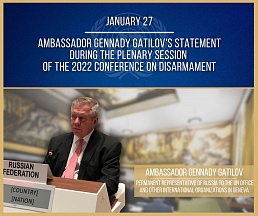
27 января / 2022
•
Statement by Ambassador Gennady Gatilov at the plenary session of the 2022 Conference on Disarmament
Statement by the Permanent Representative of the Russian Federation to the Conference on Disarmament Ambassador Gennady Gatilov at the plenary session of the 2022 Conference on Disarmament
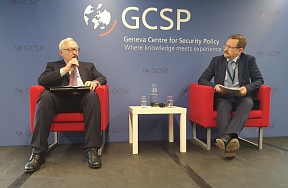
02 октября / 2021
•
Statement by Sergey Ryabkov, Deputy Foreign Minister of the Russian Federation, at the Geneva Centre for Security Policy on the theme "Strategic stability and the state of armscontrol"
First, as you are all aware, the two leaders decided to extend the New START for full five years without preconditions They also reconfirmed in a Joint Statement that nuclear war cannot be won and should never be fought. Moreover, they highlighted the priority to reduce the risk of any armed conflict between our countries. These are very important and long awaited steps by two stewards of the world’s largest nuclear arsenals - the measures that Russia has been consequently and persistently advocating for. I believe that in this context it would be very opportune to mention that Russia and China have also publicly at the highest level pronounced inadmissibility of nuclear war, as well as any armed conflict involving nuclear powers. Now, we believe it is high time for the whole P5 to jointly reiterate this formula. We see it as a conceptually significant political message both to each other and to international community as a whole.
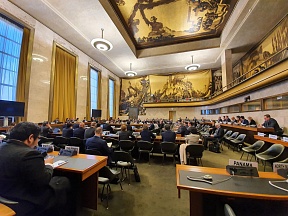
04 марта / 2021
•
Address by the Permanent Representative of the Russian Federation to the United Nations Office and the Conference of Disarmament H.E. Mr. Gennady Gatilov at the webinar "Biological & Toxin Weapons Convention Universality"
- We thank the Implementation Support Unit (ISU) of the Biological & Toxin Weapons Convention (BTWC) and the UNODA Geneva Branch for convening this virtual workshop in order to promote the BTWC. Russia, being among the founding fathers of the BTWC and one of its depositaries along with the United Kingdom and the United States, attaches high importance to the universalization and the strengthening of the BTWC as well as to the improvement of its implementation.
- Since 1975, the BTWC has remained one of the basic pillars of disarmament and international security prohibiting an entire category of weapons of mass destruction. As a collective endeavour it enshrines commitments by its State Parties to promote co-operation for peaceful purposes and provide assistance and protection from biological weapons.
- Since 1975, the BTWC has remained one of the basic pillars of disarmament and international security prohibiting an entire category of weapons of mass destruction. As a collective endeavour it enshrines commitments by its State Parties to promote co-operation for peaceful purposes and provide assistance and protection from biological weapons.

24 февраля / 2021
•
Address by Sergey Lavrov, Minister of Foreign Affairs of the Russian Federation, to the High Level Segment of the Conference on Disarmament (Geneva, 24 February 2021)
Mr. President,
Colleagues,
I appreciate the opportunity to address this authoritative forum.
2020 was a difficult year in all respects. It saw a growing destructive trend toward the collapse of the existing international arms control, disarmament and non-proliferation regimes, an increasing tension and lack of trust between UN Member States. Unfortunately, the United States continued taking steps to substitute some global "rules-based order" imposed by Washington for international law and the central role of the United Nations. After withdrawing from the JCPOA in 2018 and dismantling the INF Treaty in 2019, the United States decided, in 2020, to withdraw from the Treaty on Open Skies, thereby undermining international security.
Colleagues,
I appreciate the opportunity to address this authoritative forum.
2020 was a difficult year in all respects. It saw a growing destructive trend toward the collapse of the existing international arms control, disarmament and non-proliferation regimes, an increasing tension and lack of trust between UN Member States. Unfortunately, the United States continued taking steps to substitute some global "rules-based order" imposed by Washington for international law and the central role of the United Nations. After withdrawing from the JCPOA in 2018 and dismantling the INF Treaty in 2019, the United States decided, in 2020, to withdraw from the Treaty on Open Skies, thereby undermining international security.
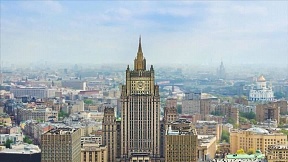
03 февраля / 2021
•
Statement by the Ministry of Foreign Affairs of the Russian Federation on the extension of the Treaty on Measures for the Further Reduction and Limitation of Strategic Offensive Arms
On February 3, 2021 the MFA of Russia and the U.S. Embassy in Moscow exchanged diplomatic notes regarding the completion of internal procedures required for the entry into force of the Agreement to extend the Treaty on Measures for the Further Reduction and Limitation of Strategic Offensive Arms of April 8, 2010 (New START). Accordingly, this Agreement entered into force on the same day. Thus the Treaty will remain in effect exactly as it had been signed, without any amendments or additions, until February 5, 2026. The telephone conversation between the President of Russia Vladimir Putin and the U.S. President Joseph Biden on January 26, 2021 became key for this development to proceed.
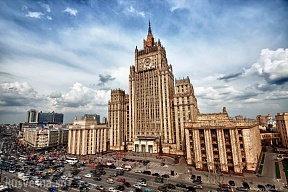
26 января / 2021
•
Entry into force of the Treaty on the Prohibition of Nuclear Weapons
The Treaty on the Prohibition of Nuclear Weapons (TPNW) entered into force on January 22. The Russian approach to this treaty has been expressed repeatedly at the relevant multilateral venues and is well known. It will remain the same after the treaty becomes valid.
Let me emphasise once again that we respect the views of those who want to renounce nuclear weapons as soon as possible. However, we do not share these positions on reaching this goal, which envision an artificial acceleration of nuclear disarmament. This is why we consider the TPNW a mistake. This treaty is unable to contribute to the limitation and reduction of nuclear arms
Let me emphasise once again that we respect the views of those who want to renounce nuclear weapons as soon as possible. However, we do not share these positions on reaching this goal, which envision an artificial acceleration of nuclear disarmament. This is why we consider the TPNW a mistake. This treaty is unable to contribute to the limitation and reduction of nuclear arms
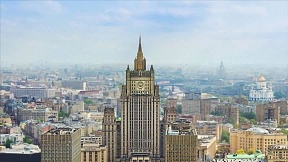
22 января / 2021
•
Press release on the future of New START
When it comes to arms control, the previous US administration worked consistently and systematically to destroy the agreements which prevented Washington from arbitrarily building up, projecting and using military force and which it saw as an obstacle on its way to “victory” in the “great power rivalry” it itself declared.
Judging by the counterproductive and openly aggressive negotiating policy of the Trump administration on extending the New START treaty, Washington was preparing an unenviable fate for that last remaining international legal mechanism of mutual restrictions on the nuclear missile arsenals of the world’s two largest nuclear powers. The United States launched a campaign to denounce New START as ineffective and irrelevant for the purposes of global security and strategic stability.
Judging by the counterproductive and openly aggressive negotiating policy of the Trump administration on extending the New START treaty, Washington was preparing an unenviable fate for that last remaining international legal mechanism of mutual restrictions on the nuclear missile arsenals of the world’s two largest nuclear powers. The United States launched a campaign to denounce New START as ineffective and irrelevant for the purposes of global security and strategic stability.
05 ноября / 2020
•
Statement by the Representative of the Russian Federation in the First Committee of the 75th Session of the UN General Assembly at the Thematic Debate on «Nuclear Weapons»
Distinguished Mr. Chairman,
Distinguished colleagues,
The promotion of international efforts aimed at achieving a world free of nuclear weapons as soon as possible is one of priorities of Russian foreign policy. The Treaty on the Non-Proliferation of Nuclear Weapons (NPT), whose fiftieth anniversary since its entry into force we have celebrated this year, is fundamental for achieving this goal.
Distinguished colleagues,
The promotion of international efforts aimed at achieving a world free of nuclear weapons as soon as possible is one of priorities of Russian foreign policy. The Treaty on the Non-Proliferation of Nuclear Weapons (NPT), whose fiftieth anniversary since its entry into force we have celebrated this year, is fundamental for achieving this goal.
05 ноября / 2020
•
STATEMENT by the Representative of the Russian Federation in the First Committee of the 75th Session of the UN General Assembly at the Thematic Debate on «Other Weapons of Mass Destruction»
Mr. Chairman, Ladies and Gentlemen,
The Convention on the Prohibition of the Development, Production, Stockpiling and Use of Chemical Weapons and on Their Destruction (CWC) is now in its third decade as one of the most important elements within the international system of disarmament and non-proliferation of weapons of mass destruction. It addresses two key issues: the elimination of an entire class of weapons of this kind and the establishment of firm barriers against the production, use, and proliferation of chemical weapons.
The Convention on the Prohibition of the Development, Production, Stockpiling and Use of Chemical Weapons and on Their Destruction (CWC) is now in its third decade as one of the most important elements within the international system of disarmament and non-proliferation of weapons of mass destruction. It addresses two key issues: the elimination of an entire class of weapons of this kind and the establishment of firm barriers against the production, use, and proliferation of chemical weapons.
05 ноября / 2020
•
STATEMENT by the Representative of the Russian Federation in the First Committee of the 75th Session of the UN General Assembly at the Thematic Debate on «Outer Space (Disarmament Aspects)»
Mr Chairman,
Outer space is the common heritage of humankind. In this regard the objective for the world community is to ensure the exploration and use of outer space for peaceful purposes, for the benefit and in the interest of all countries. Guided by that very understanding as of back to 1978, the first UNGA Special session on disarmament determined the prevention of an arms race in outer space (PAROS) and the launch of relevant negotiations in accordance with a spirit of the 1967 Outer Space Treaty as one of the key disarmament measures. The said objectives have been annually reaffirmed by the UNGA resolution on PAROS permanently supported and co-sponsored by the Russian Federation.
Outer space is the common heritage of humankind. In this regard the objective for the world community is to ensure the exploration and use of outer space for peaceful purposes, for the benefit and in the interest of all countries. Guided by that very understanding as of back to 1978, the first UNGA Special session on disarmament determined the prevention of an arms race in outer space (PAROS) and the launch of relevant negotiations in accordance with a spirit of the 1967 Outer Space Treaty as one of the key disarmament measures. The said objectives have been annually reaffirmed by the UNGA resolution on PAROS permanently supported and co-sponsored by the Russian Federation.
